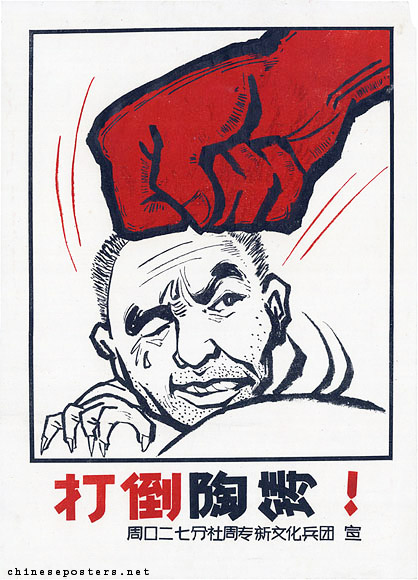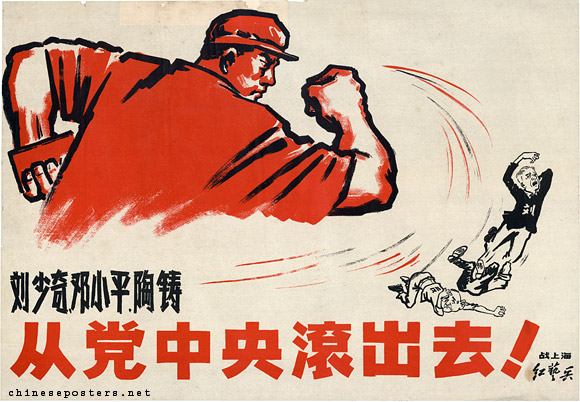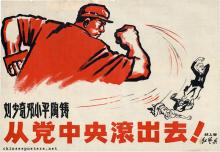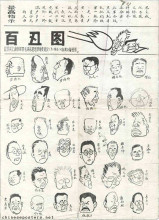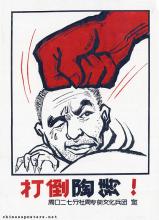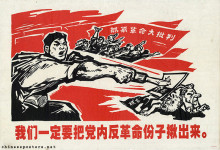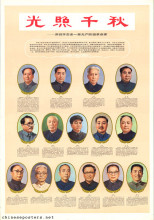Tao Zhu (陶铸, 1908-1969, Qiyang county, Hunan Province) joined the revolution in Guangdong in the 1920s. Rumored to have been a student at the Whampoa military academy and a friend of Lin Biao, he participated in a number of unsuccessful uprisings. In the early 1930s, he was active in west Fujian. He claimed to have taken part in the Long March (1934-1935), but there is no evidence of this. During the war against Japan, Tao worked in areas around Wuhan. After the Japanese defeat, he turned up in the northeast, and led troops of Lin Biao that laid siege to Beijing in early 1949. For a brief spell, he joined Ye Jianying in the administration of Beijing, but then he joined Lin’s forces again in their push southward. After the liberation of Wuhan in May 1949, he served in a number of positions, until he was assigned to Guangdong in 1952, where he emerged as the dominant political figure.
Due to his extensive knowledge of the party apparatus and his wide experience in agricultural problems, his career took off. In 1955, Tao succeeded Ye as governor of Guangdong. He was elected as a member of the Party Central Committee in 1956. In his various administrative capacities, Tao often supported policies that were pushed by the Centre: he emerged as a staunch supporter of the Great Leap Forward and an advocate of cooperation with the Soviet Union. Even though these policies later were discredited, Tao continued his rise in the executive arm of the national government. In 1965, he made two keynote speeches in which he expressed his views that the contents of traditional Chinese operas needed to be revolutionized. This standpoint supported Jiang Qing’s attempts to introduce so-called ‘revolutionary models’ (yangbanxi), and this explains why Tao’s words were reproduced in countless articles in the same year.
Liu Shaoqi, Deng Xiaoping and Tao Zhu must get out of the Central Committee of the Party!, 1966
Tao’s support for Jiang may have been the reason for his meteoric rise in 1965. Leaving Guangdong to his associate Zhao Ziyang, he assumed positions of great importance in the summer of 1966, when he became head of the Central Committee’s Propaganda Department and assumed a seat in the Central Secretariat. By August 1966, at the close of the 11th Party Plenum, he added a seat in the Politburo and the Standing Committee to his workload. His rise to fame turned out to be shortlived. After his last appearance in December 1966, he was branded a counterrevolutionary revisionist and was savagely denounced in the Red Guard and official press. Consequently, he was purged in September 1967. He was placed under house arrest and died of cancer, for which he was not treated until it was too advanced for treatment. With Deng Xiaoping’s final return to power, in December 1978, Tao was officially rehabilitated.
Wolfgang Bartke, Who was Who in the People’s Republic of China (München: K.G. Sauer, 1997)
Guo Jian, Yongyi Song & Yuan Zhou, Historical Dictionary of the Chinese Cultural Revolution (Lanham: The Scarecrow Press, Inc., 2006)
Donald W. Klein & Anne B. Clark, Biographic Dictionary of Chinese Communism (Cambridge: Harvard University Press, 1971)
Yan Jiaqi & Gao Gao (translated & edited by D.W.Y. Kwok), Turbulent Decade - A History of the Cultural Revolution (Honolulu: University of Hawai’i Press, 1996)
